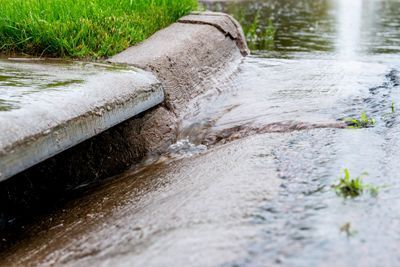Private Soil Percolation Tests - NYC, Manhattan, The Boroughs, Nassau County, Suffolk County, Long Island, and New Jersey - Kagaoan Engineering

Soil Percolation Tests for Private On-Site Stormwater Drainage Disposal Systems and Detention Facilities
When considering environmental engineering and sustainable management practices, understanding the behavior of water within soil is crucial for designing and implementing effective stormwater management systems. Specifically, soil percolation tests are essential tools used to assess the infiltration capabilities of soil, allowing engineers and landowners to make informed decisions about private on-site stormwater drainage disposal systems and detention facilities.
Contact us for free consultation.
These tests indicate how well water will move through the soil, impacting wastewater treatment, groundwater recharge, and overall site suitability for construction and landscaping. This web page will delve into the specifics of soil percolation tests, their importance for private on-site drainage systems and detention facilities, and the potential consequences of neglecting these essential evaluations.
What is a Soil Percolation Test?
A soil percolation test, commonly referred to as a "perc test," evaluates the soil's absorption and drainage characteristics. This test involves digging one or more holes in the soil to a designated depth, filling them with water, and measuring the rate at which the water seeps into the soil over time. The results provide a percolation rate expressed in minutes per inch, determining the site's suitability for specific drainage or wastewater systems.
The test serves several purposes: it assesses the drainage capacity and permeability of the soil, informs the design of on-site wastewater treatment systems, and identifies potential limitations posed by soil type or groundwater levels. A professional usually oversees the standard procedure for conducting a percolation test to ensure accuracy and compliance with local health and environmental regulations.
Why Does a Private On-Site Water Drainage Disposal System Need a Soil Percolation Test?
Private on-site water drainage disposal systems, particularly septic systems, require a soil percolation test for the following reasons:
- Treatment Efficiency: A septic system's primary role is to treat and dispose of wastewater. A soil percolation test provides vital data on how quickly the soil can absorb effluent. A slow percolation rate can lead to ineffective wastewater treatment, causing health hazards and pollution.
- Regulatory Compliance: Many local and state regulations mandate that new septic system installations undergo these tests. A percolation test is typically a prerequisite for obtaining permits to build or modify a septic system.
- Site Suitability: The results from a percolation test help assess the site's overall health for sustainable development. Insufficient absorption capacity could lead to surface or groundwater contamination, which is crucial for environmental protection.
- Mitigation of Potential Issues: A percolation test allows property owners to address any soil-related concerns early in the planning process, saving time and money. It helps to evaluate whether a pumped septic system or an alternative system is necessary based on soil absorption capabilities.
Why Does a Detention Facility Need a Water Percolation Test?
Detention facilities, which are designed to temporarily store stormwater and reduce peak runoff rates, also benefit significantly from soil percolation tests:
- Hydraulic Performance Evaluation: Understanding how fast water moves through the soil aids in designing detention facilities that effectively manage stormwater. If the percolation rate is too slow, it may lead to prolonged ponding conditions, which might be detrimental to water quality and cause unwanted mosquito breeding.
- Design Optimization: By obtaining percolation test data, engineers can optimize the design and size of detention basins. This ensures that they can accommodate the anticipated stormwater volume while promoting groundwater recharge.
- Minimization of Erosion and Flooding Risk: Adequate infiltration rates identified through percolation testing can help to mitigate flooding risks during heavy rainfall events. Misjudging a facility's infiltration capacity can result in overflow and erosion issues that damage surrounding ecosystems and infrastructure.
- Regulatory Requirements: Many jurisdictions require that percolation tests be performed before the approval of stormwater management plans, integrating them into the broader framework of land use planning and development.
What Can Happen If a Soil Percolation Test Is Not Done?
Neglecting to conduct a soil percolation test can lead to several potential adverse outcomes for both private on-site stormwater drainage and detention facilities:
- Environmental Contamination: Without adequate soil absorption, effluent from septic systems can accumulate on the surface or seep into groundwater. This can lead to contamination of drinking water supplies and surface waters, posing severe health risks.
- Legal and Regulatory Consequences: Failing to comply with local regulations can result in fines, removal of non-compliant systems, or the inability to sell or develop the property.
- Infrastructural Damage: Poorly designed drainage systems that fail to account for soil percolation rates are prone to malfunction. This can cause flooding, erosion, and damage to adjacent structures, adding financial burdens for the property owner.
- Increased Maintenance Costs: If a septic system or detention facility is established without proper percolation testing, costly corrective actions or replacements may be required sooner than anticipated, resulting in an increased lifetime maintenance burden.
- Biodiversity Impacts: Inadequately managed stormwater can lead to harmful runoff events that impact local vegetation and wildlife. Over time, these impacts can disrupt local ecosystems and diminish biodiversity.
Why You Choose Kagaoan Engineering for Your Soil Percolation Testing
Kagaoan Engineering stands out as an excellent choice for soil percolation tests due to its combination of expertise, experience, and commitment to quality service. The firm likely employs a team of qualified professionals with specialized knowledge in soil mechanics and hydrology, ensuring that the tests are conducted precisely and adhere to industry standards. Their experienced engineers bring a wealth of practical knowledge that can significantly enhance the accuracy of test results, enabling informed decisions regarding drainage and wastewater systems.
Kagaoan Engineering's familiarity with local geographic and geological conditions adds a layer of insight that generic testing services may lack. Understanding regional soil types and hydrology is critical for interpreting results correctly and advising clients on site suitability. This local expertise allows the firm to provide recommendations that are not only based on their testing but are also contextualized within the specific challenges and opportunities presented by the area.
We offer a comprehensive range of services beyond soil percolation tests, including site assessments and drainage analysis. This integrated approach can streamline the client process, ensuring that all stormwater and wastewater management aspects are considered. Additionally, working with a firm that understands the regulatory landscape is essential; Kagaoan Engineering's knowledge of local permits and compliance requirements minimizes the risk of delays or legal complications for clients undertaking such projects.
Kagaoan Engineering will also likely prioritize sustainable practices in its assessments and recommendations. By focusing on eco-friendly solutions, they can promote responsible land use and help protect local water resources. Their professionalism and commitment to clear communication throughout the process enhance the client experience, making navigating the complexities of soil testing and system design easier.
Finally, utilizing modern technology and methodologies for conducting tests can lead to more accurate and reliable results. By investing in cutting-edge tools, Kagaoan Engineering can support better decision-making for effective stormwater management and environmental protection. Overall, choosing Kagaoan Engineering for soil percolation tests means selecting a partner dedicated to delivering high-quality, reliable services that cater to the specific needs of clients and the environment.
Contact Kagaoan Engineering for e Free Consultation
Soil percolation tests are fundamental components in the design and evaluation of private on-site stormwater drainage disposal systems and detention facilities. They provide critical information on soil absorption capabilities, regulatory compliance requirements, and site suitability for constructing practical, sustainable water management practices. Failing to carry out these tests can lead to environmental contamination, legal repercussions, increased maintenance costs, and overall inadequacies in stormwater management.
As concerns about climate change and urbanization grow, understanding the importance of accurate soil percolation testing becomes even more vital to ensure safe, effective, and environmentally responsible stormwater management solutions. Prioritizing these tests protects public health and helps preserve our natural ecosystems for future generations.
Please contact us today for a free consultation.

